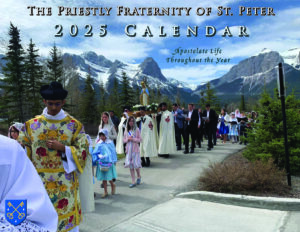Minor Orders to be Conferred
Date: October 24
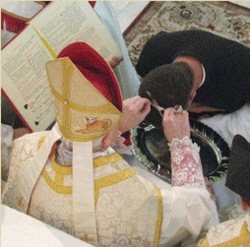
Tonsures and Subdeacon in Denton will be conferred by His Exc. Mgr. Fabian Bruskewitz, Bishop of Lincoln.
Please pray for the ordinands:
- Zachary Akers
- Eduardo Araujo
- Joshua Curtis
- Daniel Egan
- David Franco
- Daniel Heenan
- Tom Heffernan
- John Kodet
- Trevor Lontine
- Michael Malain
- Stephen Menard
- Timothy O‟Brien
- Thomas Schutzman
- Ian Verrier
Please pray for the future subdeacon Mr. Rhone Lillard.
For more information on this event, please contact Our Lady of Guadalupe Seminary:
seminary [at] fsspolgs.org
(402)797-7700
October 1, 2009

September Ember Days
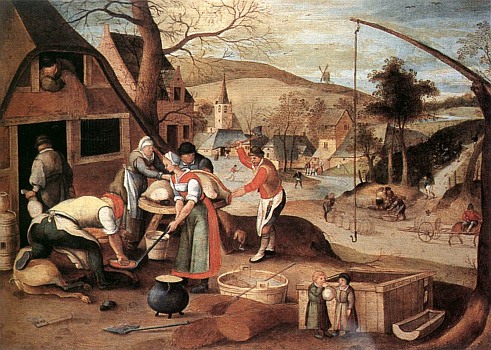
By Fr. Chad Ripperger, FSSP
Wednesday, Friday, and Saturday after the Feast of the Exaltation of the Holy Cross, September 14th, are known as “Michaelmas Embertide,” and they come near the beginning of Autumn (September 22nd) and were formerly set aside as days of fasting and abstinence. The Lessons focus on the Old Covenant’s Day of Atonement and the fast of the seventh month, but start off with this prophecy from Amos 9:13-15 :
Behold the days come, when the ploughman shall overtake the reaper, and the treader of grapes him that soweth seed, and the mountains shall dop sweetness, and every hill shall be tilled. And I will bring back the captivity of My people Israel, and they shall build the abandoned cities, and inhabit them; and they shall plant vineyards, and drink the wine of them; and shall make gardens and eat the fruits of them; and I will plant them upon their land: and I will no more pluck them out of their land which I have given them; saith the Lord thy God.
Like all Embertides but Whit Embertide, the Lessons end with the story of the three boys in the fiery furnace, as told by Daniel. The Gospel readings recount how Jesus exorcised demons from a possessed boy and tells the disciples about fasting to cast out unclean spirits (Matthew 9:16-28), forgave Mary Magdalen (Luke 7:36-50), and healed the woman on the sabbath after telling the parable of the fig tree (Luke 13:6-17). In the midst of this beautiful time, things wizen and seem to begin to die. The air grows cooler, the earth stiffens, the trees tire of holding their leaves. And during this waning we remember our dead — on November 1st, the victorious dead (All Saints’, or All Hallows Day), and on November 2nd, the dead being purified (All Souls’ Day). These Days of the Dead begin with the eve of All Hallows, or “Hallowe’en,” an unofficial evening of remembering the frightening fate of the damned and how we can avoid it. There can’t be a more appropriate time for such a night than Autumn, when foggy mists are likely, and bonfires helpful.
September 24, 2009

Elysburg Carmelites Enclosed
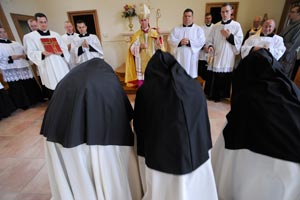
The Discalced Carmelites, mentioned in a previous article, were enclosed in their Elysburg convent on August 25th, 2009. This event joyfully took place on the 447th anniversary of St. Theresa of Jesus founding of her first reformed Carmelite convent. The Priestly Fraternity of Saint Peter has been very involved with the sisters since their founding in the Diocese of Lincoln, Nebraska.
Fr. Joseph Howard, FSSP celebrated a Solemn High Mass with many faithful present, including Bishop Kevin Rhoades of the Diocese of Harrisburg. The nuns relocated due to an increase of vocations. Fr. Howard will be the chaplain for the sisters and will provide daily Mass for the convent.
A detailed article along with photos, originally published in the Catholic Witness, may be read on the Diocese of Harrisburg website.
Prayer intentions can be sent to the Carmel of Jesus, Mary, and Joseph at 430 Monastery Rd., Elysburg, Pa., 17824 or given via phone at 570-672-2122.
For more information go to:
September 22, 2009

Seminary Chapel Progress – September 2009
Our new chapel at Our Lady of Guadalupe is coming along nicely. We thank all of our benefactors for their generous support. Please take a moment to view our progress this month.
If you would like to help financially with this project, please go to our Contributions Page. Thank you and may God reward you!
September 16, 2009

Our Lord Jesus Christ’s Testimony of Himself as the Messiah
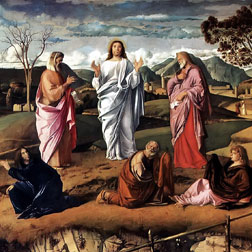 by Fr. James B. Buckley, FSSP
by Fr. James B. Buckley, FSSP
(From the August 2009 Newsletter)
Pope Saint Pius X condemned the proposition that “Jesus when He was exercising His ministry did not speak for the purpose of teaching that He is the Messiah…” (Denzinger 2008).
The pope’s condemnation can be verified from an examination of the four Gospels. Besides calling Himself the Son of man, a messianic title, He assented when Caiphas asked if He was “the Christ, the Son of God” (Matt. 26:64), told Pontius Pilate that He was a king but His kingdom was not of this world (John 18:36), and answered the Samaritan woman who spoke of the coming Messiah, “I am He” (John 4:26).
In addition to these well-known examples, there are several others which prove that during His public life Jesus taught that He is the Messiah. First of all, Catholics know that at Cesarea Philippi our Lord asked His apostles, “Whom do you say I am?” Peter replied, “You are the Christ, the Son of the living God.” Approving this answer, Jesus said, “Blessed art thou Simon Bar Jona: Because flesh and blood hath not revealed it to thee, but my Father who is in heaven” (Matt. 16:17).
He teaches the disciples of John the same truth. While their master was in prison, a delegation of them came to Jesus in an effort to find out if He was the Messiah. “Are you the one who is to come,” they asked, “or do we look for another?” Jesus replied, “Go and relate to John what you have heard and seen. The blind see, the lame walk, the lepers are cleansed, the deaf hear…” (Matt. 11:3–6). This answer is evidently an affirmation. What makes it even more striking is that Isaias, after foretelling that “God himself will come to save you,” prophesies: “then shall the eyes of the blind be opened, and the ears of the deaf shall be unstopped. Then shall the lame man leap as a hart and the tongue of the dumb shall be free” (Isaias 35:4–6).
Saint Luke records that after His temptations in the desert our Lord went to the synagogue in Nazareth where on the Sabbath He read from Isaias 61:1: “The Spirit of the Lord is upon me. Wherefore he hath anointed me to preach the gospel to the poor…” He then announced to the congregation: “This day is fulfilled the scripture in your hearing” (Luke 4:21). By these words He implied that He was the Messiah sent by God to evangelize the poor.
In chapter 12 of Saint Matthew’s Gospel, moreover, there are repeated statements in which Jesus all but explicitly declares that He is the Messiah. Referring to Himself, He says: “But I tell you that there is here a greater than the temple.” Speaking again of Himself, He says: “For the Son of man is greater that the Sabbath.” Then, comparing Himself to the prophet Jonas, He proclaims, “Behold a greater than Jonas is here.” And although Solomon was regarded as the wisest of the kings of Israel, Jesus announces: “Behold, a greater than Solomon is here.”
The evidence already presented more than suffices to justify Pope Pius X’s condemnation; nevertheless, I will include a few statements recorded by Saint John which demonstrate that our Lord claimed not only to be the promised Messiah but also God Himself. In one altercation with the Pharisees, for example, He said: “Amen, amen I say to you, before Abraham was made, I am” (John 8:58). At another time He told the unbelieving Jews: “I and the Father are one” (John 10:30). When the apostle Phillip asked Him “show us the Father,” Jesus answered: “Phillip, he that seeth me seeth the Father…Believe you not that I am in the Father and the Father in me?” (John 14:8–10).
Because of our Lord’s sanctity, His own testimony of Himself is a powerful proof that He is, at least, the legate of God. His miracles, His unerring prophecies and the prophecies that He Himself fulfilled provide overwhelming proof that He is, indeed, the Expectation of the nations.
August 26, 2009

Confraternity Pilgrimage – Italy, France, & Bavaria
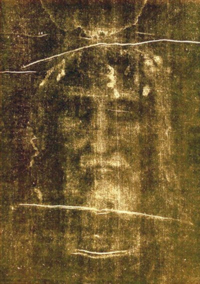
Come along May 17-27, 2010 with Father Neal Nichols, FSSP as the Confraternity of Saint Peter travels to historic and sacred Italy, France, and Bavaria to commemorate the Year of the Priest. On this trip you will be blessed to visit the following places:
- Shroud of Turin Exposition (of the 6th exhibition since 1898)
- Saint Don Bosco
- Laus & La Salette
- Grand Chartreuse Abbey
- Ars
- Paray La Monial
- Oberamergau Passion Play (performed every decade since 1634)
For more details call Syversen Touring at 1(800)334- 5425 or go to www.syversentouring.com/ars
August 19, 2009

Confraternity Pilgrimage – California Missions
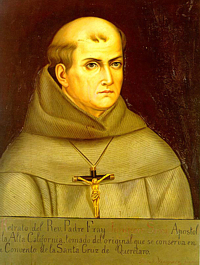
Come along October 19-27, 2009 with Father James Fryar, FSSP as the Confraternity of Saint Peter travels to the historic California Missions. On this trip you will be blessed to visit the following places:
- 12 Historic California Missions
- Miracle Swallows of Capistrano
- Danish Village of Solvang
- St. Thomas Aquinas College’s new chapel
- California’s beautiful coastline
- Sonoma Cline Winery & Mission Museum
All-inclusive land cost: $1995 from San Deigo. To download a brochure, go to www.syversentouring.com/confraternity/
For more details, call Tish Gallagher at 1 (916) 223-3112 or Syversen Touring at 1(800) 334-5425

Pragmatism by D.Q. McInerny, Ph.D.
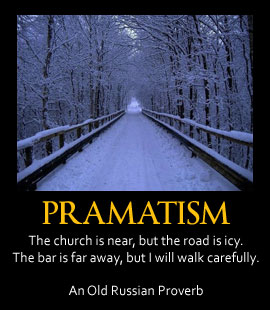 (From the August 2009 Fraternity Newsletter)
(From the August 2009 Fraternity Newsletter)
Most of us would be prepared, I suspect, to see something to admire in what was presented to us as a pragmatic approach to life, that is, the kind of approach taken by someone who has a clear-eyed sense of a job to be done, a goal to be reached, and then forthrightly chooses the most efficient means to do that job or reach that goal. By and large, we are inclined to praise those we regard as practical people, whereas the adjective “impractical” is almost never applied by way of a compliment. Impractical people might make nice company in relaxed social situations—because, say, they are witty, or sprightly conversationalists, or good listeners—but we would be reluctant to pick them as our helpers in the kitchen or workshop.
Of course, it’s a bit simplistic to suggest that the world can be neatly divided into practical and impractical people, as if a person were purely the one or the other. Most of us are admixtures of both the practical and the impractical, and which of these two dimensions of our personalities might come to the fore varies over time. We have our good days, when we match means to ends with a facility which might surprise even ourselves, accomplishing all sorts of things with the greatest of ease. Then there are those days when we seem to be all thumbs, and none of our projects are brought to completion, or, if they are, only in a droopy, unimpressive way.
Could we say that pragmatism, or practicality, is a virtue? Well, not just as such, but we could regard it as an element of the virtue of prudence, that queen of the moral virtues which is our sure guide in leading us to what is truly good for our total welfare as rational creatures made in the image and likeness of God. If the heart of practicality is choosing the most efficient means to attain an end, then whether or not the exercise of our practicality in any given instance is worthy of praise would all depend upon the moral quality of the end we are pursuing, as well as on the moral quality of the means we employ to achieve that end. And there is the critically important point, a point which, unfortunately, would seem to be lost on many people today. We live at a time when expediency rules, sometimes an expediency of the crudest kind. I speak of an attitude that systematically ignores the moral quality of ends and means, and blindly exercises a practicality which is thoroughly barren because it is completely at odds with virtue. Let us state the case plainly: there is no merit in being practical if our practicality is not in the service of the good.
Americans tend to pride themselves on being a practical people, and I suppose in certain respects there is some justification for considering ourselves to be such, for better or for worse. But whether Americans are more practical than any other people you could name—the Chinese, for example—is an arguable point. What isn’t arguable is the noteworthy fact that Americans have provided the world with a distinct theoretical articulation of the pragmatic approach to life, taking the form of the one philosophy which is indigenous to this country, a philosophy which is called, fittingly enough, pragmatism. The three American philosophers whose names are most closely associated with this philosophy are Charles Sanders Peirce (1839–1914), William James (1842–1910), and John Dewey (1859–1952). Pragmatism, in not a few of its features, is an interesting philosophy, and it has some positive aspects to it. It is also, in my opinion, a philosophy which is quite revealing of the general tone of the culture of the country from which it emerged. But, taken as a whole, that is, as a philosophy, pragmatism is fatally flawed. In fact, it can be called a false philosophy.
Why does it deserve so harsh an indictment? Because of its profound confusion over something which is of the greatest consequence, something which it should be the principal business of philosophy to be as clear as possible about—the truth. Considered in the broadest and most fundamental terms, the truth can be understood simply as what is, objective reality, the way things actually are, which the human mind, if it is functioning correctly, strives at every turn to be measured by. The egregious mistake made by pragmatism is to regard truth as simply what works. Truth ceases to be something which is firmly grounded in the objective order, the standard by which the human mind is shaped and directed, and is reduced to a purely functional status. Most importantly, truth, for the pragmatist, is an essentially subjective phenomenon. The idea that there is the truth goes by the board. Truth becomes fluid, ever subject to change, for what worked yesterday may not work today, and tomorrow’s truth will very likely render today’s truth obsolete. Given the subjectivism which underlies the pragmatic understanding of truth, the door is then flung wide open to relativism. What works for you in the moral realm may not work for me, and vice versa, and thus we no longer live in a unified, coherent ethical universe. We do not have a shared moral language.
The attitude toward truth promoted and fostered by philosophical pragmatism is prevalent, if not dominant, today, especially in the political domain, and this is the case not only in America but in Western culture in general, and beyond. We have become pragmatists in the worst possible sense. We forge ahead in madcap fashion to implement plans and policies regardless of their moral quality. The only consideration is, Will they work? Will they be effective in bringing about the changes we want to bring about? This is bankrupt practicality; this is practicality gone berserk. The fact that moral questions are seldom raised, or, seemingly, even entertained, shows the depth and seriousness of our moral obtuseness, not to say degradation. Our mindless pragmatism has succeeded in effectively de-humanizing us. We have become a very efficient people—we can murder babies by the millions, and with the most up-to-date procedures—but we have managed to lose our souls in the process, for we have set our faces against the truth. But the truth will not be trifled with. We may delude ourselves into thinking that we can reconstitute reality according to our own tragically impoverished specifications, but it is always the case that reality, not man’s lying version of it, will triumph in the end. And as history has often shown, when truth eventually triumphs, it crushes those who sought to abuse it.
August 9, 2009

Seminary Chapel Progress – August 2009
Progress on our chapel is progressing steadily. Thank you to all of our benefactors who are making this project possible! Below is an updated photo album as of August 2009.
August 7, 2009

20th Anniversary Rome Pilgrimage 2008
This is a small photo gallery from our Rome Pilgrimage last year, celebrating our 20th anniversary.
August 4, 2009








